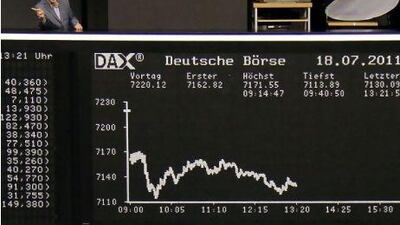Stock markets around the world and the price of oil tumbled yesterday as concerns over sovereign debt defaults in the US and the euro zone continued to worry investors.
More Business news: Editor's pick of today's content
Industry Insights // Moroccan property takes a tumble Morocco's holiday home market was devastated by regional events, including a terrorist bombing, leaving several large-scale developments stalled. Read article
EU emissions tax set to push up flight prices Airlines could be forced to pass on higher costs to passengers as the European Union's emissions trading scheme comes into effect in January. Read article
1,000 homes to boost sluggish sales market Aldar Properties has started handing over homes in Al Zeina on Raha Beach, one of the largest developments in the city open to international buyers. read article
The price of gold, meanwhile, soared past US$1,600 for the first time as the same investors sought a safe haven from the global turmoil.
"There's a battle taking place in investors' minds," said Henk Potts, a market strategist at Barclays Wealth.
Despite improving corporate earnings, "you've got the dark clouds of a difficult macro-environment, the euro-zone debt crisis and worries about the creditworthiness of the US and the potential of default", he said.
Most Gulf markets ended lower as the negative sentiment soured regional investment appetite.
European stock markets took a battering after stress tests to the EU's banking system failed to ease concerns the region's debt crisis would worsen.
The Stoxx Europe 600 Banks Index dropped to a two-year low yesterday, with banking stocks among the worst performers.
European leaders are holding a special meeting this week in an effort to stem the debt crisis.
Greece, Portugal and Ireland have already required financial bailouts to avert risks of defaulting on government debts. Eight out of 90 banks in the EU failed stress tests, the European Banking Authority said after the close of trading on Friday.
But the tests have been criticised as not being vigorous enough because regulators did not include the potential impact of a Greek default in the assessment.
The euro yesterday weakened to a record low against the Swiss franc, while the cost of insuring European sovereign debt rose to a new high.
In the US, markets also opened lower as the deadline for a government debt deal nears with no resolution on the horizon. Politicians remain divided over the deal to raise the government's debt ceiling.
In early trading the Dow Jones Industrial Average was down more than 139 points, or 1.1 per cent, at 12,340.05. The Standard & Poor's 500 Index was down 1.06 per cent, at 1,302.13. The Nasdaq was down 1.18 per cent, at 2,756.94.
Brent crude prices fell for a third day in a row to US$116.45 a barrel.
Gold had its longest winning streak since 1980 as investors piled into the haven asset. The price of gold soared as high as $1,605.25 per troy ounce, having risen 6.24 per cent since the start of the month.
Negative sentiment from the EU and US also weighed on local markets yesterday, with the Abu Dhabi and Dubai bourses among those closing lower.
"The markets are under pressure, and the sentiment from Europe and US is not helping," said Mohammed Ali Yasin, the chief investment officer at CAPM Investment in Abu Dhabi. "Across the board we see a lack of appetite for buying."
The darkening outlook came as a Nomura report warned that sovereign debt woes in the EU risked spilling over to hurt banks and sovereign wealth funds in the Middle East and North Africa (Mena) region.
About 10 per cent of the foreign exposure of periphery European and French banks related to UAE lenders, estimated Nomura. Other exposure ranged from more than 90 per cent in the case of Moroccan banks to 40 per cent for Saudi Arabian lenders.
"The financial sector linkages could be the most immediate and if there's a significant impact on the euro it could impact sovereign wealth funds in the Gulf," said Ann Wyman, an analyst at Nomura.
The Mena region's banks were "meaningfully" exposed to Europe, the Nomura report said.
If linked European banks suffered either a significant risk event in Europe or balance-sheet impairment due to distressed sovereign debt conditions, the risk they would pull back on exposure to other areas including North Africa would increase, it said.
"This will leave most of the North African countries particularly exposed," Nomura said.
An assumption could be made that sovereign wealth funds had about 30 per cent exposure to the euro zone, it added, while other risks to the region stemmed from potential downward pressure on oil prices and lower trade and tourism.

